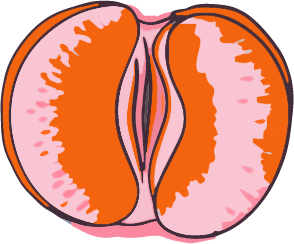How you process your trauma is valid.
In collaboration with Roisin Ross.
Heard of hypersexuality? Probs not. Like a lottttt of healing after sexual abuse, it’s not really spoken about. What you’ve probably come across instead, is the concept of the ‘ideal victim’, that which portrays survivors of sexual abuse as traumatised, silent, scared and anxious. Yes, some survivors may present themselves like this, but equally, some may be angry or opinionated or loud or horny or whatever other fucking emotion they feel that day. They’re all equally valid emotions.
We need to stop with the harmful judging of survivors on their journey towards healing, regardless of how they get there. No one is any less of a victim if they don’t fit into the tiny, twisted box of the ‘ideal victim’. This stereotype is exactly what feeds into thongs being held up in courtrooms, women being told not to jog while listening to music and the entirely warped perception that the absence of “No”, somehow means “Yes”.
Survivors can also want to have sex, be horny and enjoy sex. Sex and sexual abuse are entirely different things. Sex is intimate, passionate, and fun. Sex is consensual; sexual abuse is not. Actively engaging in sex, post-sexual abuse, can be part of a survivor’s journey to healing by trusting a person again (which is insanely brave) and regaining consent. Some survivors may never want to do this, some may do it a few months, years or even decades after. Some may do it the next day. Assuming there is one universal reaction to sexual abuse is completely untrue. So, we’re here to talk about hypersexuality.
Hypersexuality is the pursuit of casual or non-intimate sex. Hypersexuality can be a way for survivors to regain control, replay a different outcome and reshape gendered expectations. It can be an increase in libido, sexual desires, and fantasies. Having sex post-sexual abuse is powerful and takes immense courage. Positive sexual experiences focused on your pleasure, control and boundaries are empowering. For someone who has had consent ripped from them, actively giving someone consent can feel orgasmic. Literally. Which can sound bizarre for someone who has only ever experienced sex. *We’re not out here calling it ‘consensual sex’, any form of non-consensual sex is sexual abuse. Non-consensual sex = rape, end of.
Orgasms and intimacy can be part of a survivor’s journeys towards healing but, healing can also be difficult. It is not a straightforward path to feeling ok again.
Healing is not linear.
Although hypersexuality can be a healing technique for some, it can be damaging for others. Every survivor is different. Hypersexuality can be a method of self-harm. Hypersexuality can include having a lot of unprotected sex, it can be a sudden interest in extreme or violent sex, or it can be a form of punishing yourself or pushing personal boundaries. This can be triggering and retraumatise survivors.
Focusing on your pleasure is empowering. You can do this on your own, with a new sexual partner or by revisiting an old flame (we’ve all done it). The important thing is to feel safe, you deserve that.
How can you practice hypersexuality safely?
- Use condoms, sexual health is wealth!
- Communicate with sexual partners. Express feelings and set your boundaries.
- Check in with friends before and after meeting a sexual partner. You can have code words with friends, send pictures and numbers or your location on a group chat.
- Set up ‘safe words’ with sexual partners.
- Write a log after every sexual encounter, what did you gain from this? How did it make you feel? What felt good? Do you still feel empowered doing this? If the outcomes aren’t positive is this still safe for you?
Not want to practice hypersexuality? Then don’t, however you decide to process your trauma is entirely valid. The important thing is that you know you deserve to heal. Because you fucking do. Reading this may have scared you but stay as strong as you can. Healing is individual for everyone and this might just be the opposite side of healing for you – that’s ok! You are getting through each day too, just in an entirely different way. If you are looking for some self-love post sexual abuse take a look at our booklet for survivors.
Rape Crisis Helpline: 0808 802 9999
Domestic Abuse Helpline: 0808 2000 247
Survivors UK Helpline (male rape and sexual abuse): 0203 598 3898
Galop LGBTQ+ Helpline: 0800 999 5428
*This was written in collaboration with Roisin Ross, an Independent Sexual Violence Advisor (ISVA), if you are thinking about reporting any form of sexual abuse get yourself an ISVA. They will help guide you through the criminal justice system and make sure you feel in control and informed.
